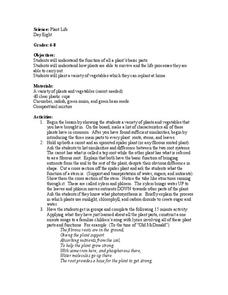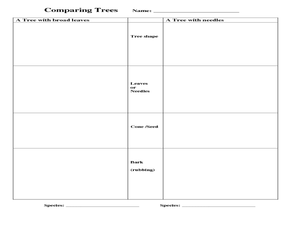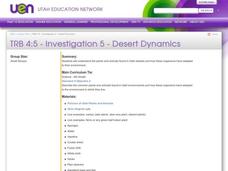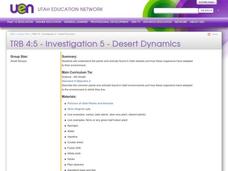Curated OER
Life is Weird
Learners study the organisms that are found in cold seeps and see how they interact with each-other. In this biological organism instructional activity students describe the major features of cold seeps and the process of chemosynthesis.
Curated OER
This Life Stinks
Learners study cold seeps and see how organisms obtain energy from methane. In this sinkholes lesson plan students examine the relevance of chemosynthesis to communities.
Curated OER
Life is Weird
Students describe features of cold seep communities and list organisms that can be found in these communities. In this exploratory lesson students complete an activity and describe the process of chemosynthesis.
Curated OER
From the Gulf of Mexico to the Moons of Jupiter
Students compare deep ocean conditions to those found on the moons of Jupiter. In this Earth science lesson, students consider the possibilities and conditions needed to support simple life. Students examine the habitats and life found...
Curated OER
Biomass: The Energy of the Future
Students research renewable fuels. In this alternative energy lesson, students compile information and create a comparison chart on renewable resources. This lesson includes additional suggested readings, vocabulary, and a Biomass...
Curated OER
Plant Life
Middle schoolers study plant parts and their functions. In this plant life instructional activity students participate in an activity of planting plants.
Curated OER
Let's Sort a Salad
Students examine edible plants by identifying salad ingredients. In this botany lesson, students discuss the different vegetables that can be eaten in a salad and draw them on a worksheet. Students review vegetable vocabulary and examine...
Curated OER
Ecosystems - Plants and Animals Together
Students study the biotic and abiotic factors of an environment. In this exploratory lesson plan students examine the different trophic levels and how organisms are connected.
Curated OER
Temperate Forest: Comparing Deciduous and Evergreen Trees
Students compare deciduous and evergreen trees. For this tree lesson, students list the differences between these two species of trees.
Curated OER
The Way a Tree Works
Pupils explore nature by conducting botany experiments. In this plant life lesson, students define the necessary resources for a plant to thrive on our planet while defining scientific vocabulary terms. Pupils utilize different plant...
Curated OER
Microscope Investigation
Young scholars explore physical science by participating in a science examination. In this microscope tutorial lesson plan, students read the book The Naked Eye and discuss the purpose for using a microscope in the field of science....
Curated OER
Eat Your Plants
Students explore fruits and vegetables. In this fruits and vegetables lesson, students work in small groups investigating plant parts. Students discover that fruits and vegetables originate from different parts of plants.
Curated OER
Food Chains
Young scholars create their own food chains on Kidspiration starting from the energy of the sun and what it creates. In this food chains lesson plan, students learn about how insects eat plants and so on.
Curated OER
Mycorrhiza
Students examine the symbiotic relationship between fungus and plants. For this ecosystem lesson students complete several mycorrhiza experiments.
Curated OER
Algae Experiments
Students describe the characteristics of algae. In this biology lesson, students perform a series of experiment to explore algae. They investigate the basic things algae need to survive.
Curated OER
Mold
Students explore mold, the different types and the health risks that they pose. In this mycelium lesson students grow different molds and see which type of foods mold the fastest.
Curated OER
Dissolved Oxygen Lesson
Students investigate what dissolved oxygen is and why it is important to aquatic life and what factors influence levels of dissolved oxygen in a lake. They study how to use MS Excel to make charts to show trends and correlations.
Curated OER
Desert Dynamics
Students investigate the plants and animals found in Utah deserts and how these organisms have adapted to their environment. They brainstorm ways that desert plants are different from or similar to wetland plants.
Curated OER
Water Quality and Temperature
Students are led through three activities to explore the effect of temperature fluctuations on the growth and survival of aquatic plants, clams, and shrimp eggs.
Curated OER
Primary Producers
Students examine the role of carbon in the oceans and how phytoplankton determine the levels present. In groups, they practice measuring primary productivity using two methods. They use the internet to research the role of phytoplankton...
Curated OER
Sugar and Light
Learners connect starch to sugar as the storage form of energy. They find that no starch is produced in the plant without light. Students perform the old favorite of looking at starch deposition in geranium leaves using Lugol's iodine...
Curated OER
Desert Dynamics
Fourth graders examine the various types of plants and animals found in the deserts of Utah. In groups, they discover how the plants and animals have adapted to the harsh environment. To end the lesson plan, they compare and contrast...
Curated OER
Carbon and Oxygen Cycles
Students construct their own diagrams outlining the pathway of carbon and oxygen in the atmosphere. Students explain their diagrams outlining the pathway and teacher checks for accuracy and completion.
Other popular searches
- Photosynthesis Worksheets
- Photosynthesis Crossword
- Photosynthesis & Respiration
- Photosynthesis Lab
- Photosynthesis Role Play
- Biology Lab Photosynthesis
- Photosynthesis in Plants
- Science Photosynthesis
- Photosynthesis / Respiration
- Plant Biology Photosynthesis
- Photosynthesis and Respiration
- Unit Photosynthesis

























